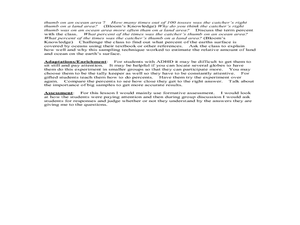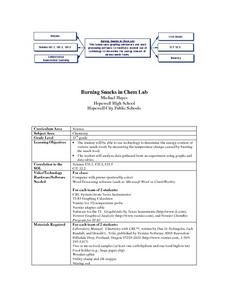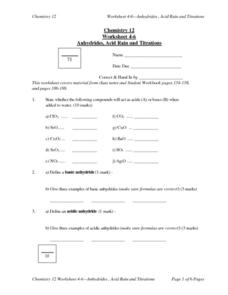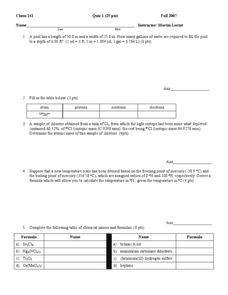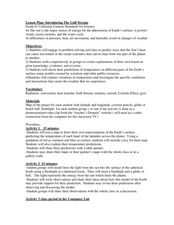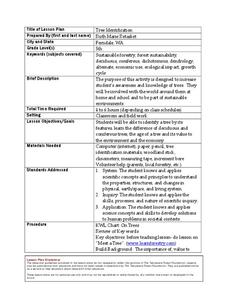Curated OER
The Power of Ice
For this the power of ice worksheet, students conduct an experiment with freezing water by hypothesizing, following the four step procedure and writing a conclusion.
Curated OER
Building Materials
Fifth graders are presented with three rocks and a variety of tools and are asked to investigate the properties of the rocks to see which rock is best for building tables and benches for a museum picnic area.
Curated OER
What Part of the Earth's Surface is Covered by Oceans?
Third graders investigate oceans. In this Earth science lesson, 3rd graders predict how much of the Earth's surface is covered by oceans. Students determine if their predictions are accurate by throwing a globe to...
Curated OER
An Introduction to 'Opae 'ula
Students examine the 'opae 'ula. In this science lesson, students observe a live specimen and identify the major body parts. Students construct habitat jars and observe the 'opae 'ula behaviors.
Curated OER
Why is There a Tidal Bulge Opposite the Moon?
Students simulate how the Moon causes ocean tides. In this earth science lesson, students calculate gravitational acceleration using a mathematical formula. They compare the force of attraction between the Earth, Moon and Sun system.
Curated OER
Electronegativity
Students identify the type of bonding between two atoms of elements given their electronegativity values. They study the trend of electronegativity across the periodic table in small groups.
Curated OER
Static Electricity
In this static electricity worksheet, middle schoolers use balloons, flannel cloths, and a plastic bag to create static electricity. Students then fill out 3 tables and answer 3 short answer questions.
Curated OER
Investigating the Shapes of Covalent Molecules and Measuring their Respective Bond Lengths and Bond Angles
High schoolers will draw Lewis structures of common covalent compounds using a Chem 3D computer program. They will predict the shapes of the molecules, complete a data table, and formulate rules for predicting shapes of molecules. In the...
Curated OER
Burning Snacks in Chem Lab
High schoolers determine the energy content of various snack foods. They measure the temperature changes in various snack foods as the foods are burned in order to determine the foods' energy content. Students create graphs and data...
Curated OER
Review of the Scientific Method
Students review the Scientific Method with a hands-on activity. Working with a partner, they hypothesize the number of water drops that fit on the heads side of a penny. They collect data and share their results with the remainder of...
Curated OER
Starch is Everywhere
In this science activity, students add a few drops of iodine solution to each of 10 substances to determine if they contain starch. The iodine will turn blue if the item contains starch.
Curated OER
Anhydrides, Acid Rain and Titrations
In this chemical compounds worksheet, students determine is compounds will act as acids or bases when added to water. Students compare basic, acidic, and amphoteric anhydrides. This worksheet has 15 fill in the blank, 2 short answer...
Curated OER
Bean Experiment
Students place beans in plastic bags with water and observe changes. In this germination lesson, students observe and record how many beans sprout each day. Students may also weigh beans, count beans or eat beans.
Curated OER
Quiz 1-Problem Solving and Naming Compounds
In this problem solving learning exercise, learners are given five problems including calculating volume given the dimensions of a pool, determining the number of subatomic particles in an atom, filling in a table with chemical names and...
Curated OER
Biochemistry Assignment
In this biochemistry worksheet, students complete a table by filling in the missing information about different elements. Students draw the Bohr diagram and the Lewis dot diagram for several atoms.
Curated OER
Introducing The Gulf Stream
Sixth graders research the average temperatures of different places on Earth. In this earth science lesson plan, 6th graders explain how the sun's heat cause ocean movement. They discuss how temperature change affects the weather we...
Curated OER
Paper Mache Globes
Third graders create a paper mache model of the earth. At the conclusion of a discussion about the earth, they are given paper mache materials, they create their globe and appropriately draw and label landforms, bodies of water and the...
Curated OER
Selecting Soil For a Sports Field
For this science worksheet, students take part in a laboratory exploration looking at different types of soil. The soil is evaluated in order to fill the role of becoming a sports field.
Curated OER
Fall vs. Spring
Learners learn about fall and spring by engaging in hands-on activities in order to fulfill science and language arts standards. In this instructional activity on seasons, students first listen to a story about fall, discuss the...
Curated OER
Separation of Unknowns in a Liquid
Students identify the different components of a given sample using chromatography. In this chemistry lesson, students compare paper and column chromatography. They collect data and construct data tables.
Curated OER
Skateboards, Rocket Balloons and Newton's Laws of Motion
Students investigate forces. In this laws of motion lesson, students visit the Glasgow Science Center or Techniquest to participate in activities related to the Newton's law of motion.
Curated OER
Testing for Life
Students discuss food and the food groups and their organic nature. They test 3 different solutions and test for protein, starch and glucose. In addition, they create a master table on the board to collect all the teams results.
Curated OER
Tree Identification
Students list four ways to identify trees. In this tree identification instructional activity, students use tree identification techniques such as leafs, bark, wood grain, soil type, and climate to create tables and graphs.
Curated OER
Fossil Formation
Students discuss fossils. In this science lesson, students simulate fossils within Earth's layers by using gummy fish and bread.


